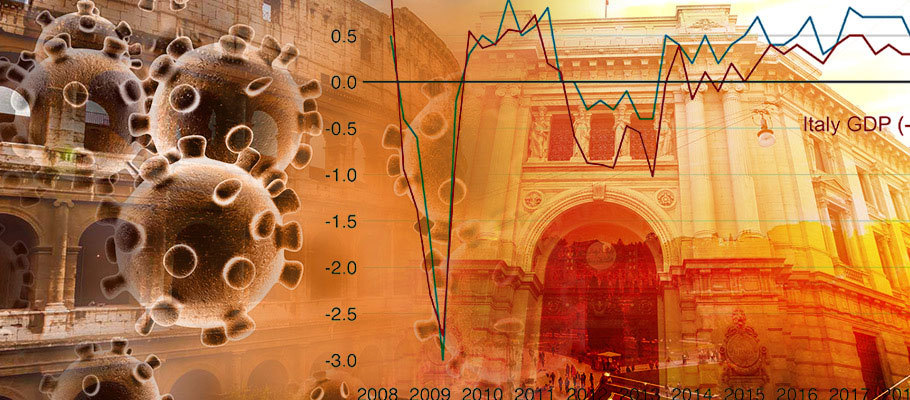
Published: February 12th, 2020
Italy’s central bank is warning that moves to halt the spread of coronavirus could negatively impact the Italian economy, risking growth projections as the government restricts trade and travel to and from China.
Italy’s national debt is now the world’s third-largest, running at more than 1.3 times the GDP. The economy’s performance is key to managing and sustaining public debt levels.
In a statement last week, the International Monetary Fund (IMF) said Italy's public debt is likely to stay at record highs, and even rise in the coming years.
The Bank of Italy is studying the Coronavirus outbreak’s impact on economic output, but analysis is complicated due to uncertainty over how long the outbreak will last.
Speaking to the annual Assiom-Forex conference, central bank governor Ignazio Visco told attendees and press that the outbreak’s impact on the European and Italian economies could be limited to a few decimals of a percentage point, but ‘a more significant impact cannot be ruled out.’
Given the importance of China as an export market and source of infrastructure investment, the bank's principal concern is the potential for slower growth in aggregate demand for Italian goods and services.
Comparing the current situation to the time of the SARS outbreak in 2002-2003, Visco said China's role in the global economy is much bigger than it was then, with the country’s contribution to global GDP growing by a factor of four.
Another concern is the potential for a ‘de-globalisation’ effect, where people travel and trade less due to contagion fears. This could lead to uncertainty over future demand and limit investment opportunities.
Transparency and a fulsome campaign to share information about Coronvirus and its real risks are going to be vital in avoiding un-informed reactions, he added.
The World Health Organization (WHO) has declared the outbreak a full-on epidemic and a public health emergency. A series of official health warnings and recommendations have been issued by the body to several countries in hopes curbing the spread of disease across borders while minimising interference with travel and trade.
Current restrictions to travel and trade are expected to hold back global and Chinese economic activity in Q1.
Less than a year after Italy had pitched itself for significant investments in infrastructure, services, and technology by signing up to China’s sweeping Belt and Road initiative, Rome’s ban on flights to and from China has complicated diplomatic ties.
Flights to and from China, Hong Kong, and Taiwan were suspended on 31 January in an attempt to slow the spread of the outbreak. Expected to last until April 28, it was the first travel ban to China implemented by an EU member state, followed shortly after by a similar ban issued by the Czech government.
Beijing is pushing back aggressively against a raft of travel restrictions put in place around the globe, calling them an over-reaction and making efforts to convince Italy’s government to change its mind.
Following a meeting of government ministers in Rome in early February, Prime Minister Giuseppe Conte said in a statement that the government would maintain its policy of ‘maximum precaution’ to protect the health of Italian citizens.
Speaking to national newspaper Corriere della Sera, Health Minister Roberto Speranza said that while diplomatic relations and economic issues needed to be considered, the ‘right to health is even more important.’
Strained diplomatic ties with China have dulled optimism in Rome following Chinese President Xi Jinping’s visit to the country in March, where Italy’s participation in the Belt and Road initiative was announced.
The memorandum of understanding was worded so strongly that concerns were raised in Brussels and Washington over China’s sudden strengthening of economic influence in the eurozone.
The Belt and Road memorandum promised major contracts for Italian companies like financier Intesa Sanpaolo and energy giant Eni. An agreement was also signed between China Communications Construction the ports of Genoa and Trieste.
On the back of last week’s Bank of Italy warning, it was announced that the Italian economy shrank by 0.3% between October and December, after a smallish (0.1%) expansion the previous quarter.
Speaking at the Assiom-Forex conference, Italy’s minister for the economy Roberto Gualtieri said he was confident the country’s economy would accelerate again this year, attributing the growth setback in part to temporary factors seen at the end of 2019.
Central bank governor Visco, however, reiterated that significant downside risks were behind expectations of low growth in 2020, though followed by higher growth in 2021-2022.
‘The outcome will depend on how the global economy and our main European trading partners fare in the coming year,’ he added.
While confirmed cases of coronavirus have been minimal in Europe, the economic effects may be more difficult to quarantine – pushing the Italian economy, and perhaps even the entire eurozone, into a recession.
A growing number of economists have concluded that, even in the best case, it will take weeks for the Chinese economy to return its role as a leading investor in, and market for, Europe’s goods and services.
Jörg Krämer, chief economist at Commerzbank in Frankfurt, told Bloomberg that risks would remain high for as long as it takes Chinese production to resume to pre-outbreak levels.
US Federal Reserve chair Jerome Powell, meanwhile, told American lawmakers last week that the rest of the world could suffer economically from China’s self-imposed lowdown.
The Fed is monitoring the spread of coronavirus and analysing disruptions in China that could overspill onto the global economy; he told the House Financial Services Committee.
In a briefing note to clients last week, Deutsche Bank economist Stefan Schneider said the outbreak could put the brakes on the expected global recovery, given how projections were pegged to improvement of the Chinese economy. ‘Recession in Germany this year is now quite probable, he wrote.